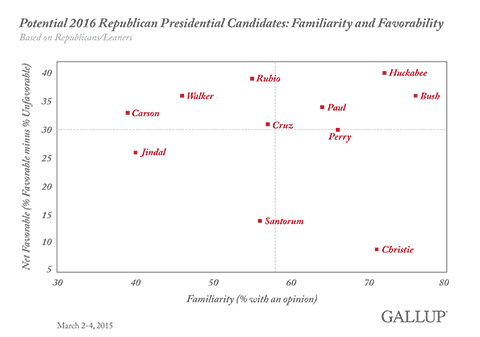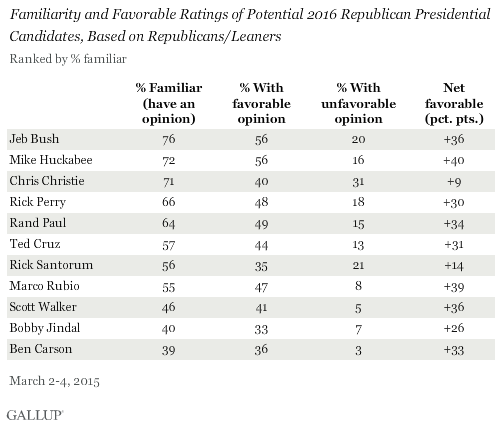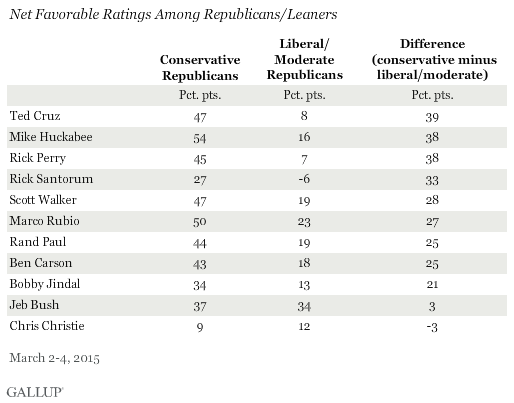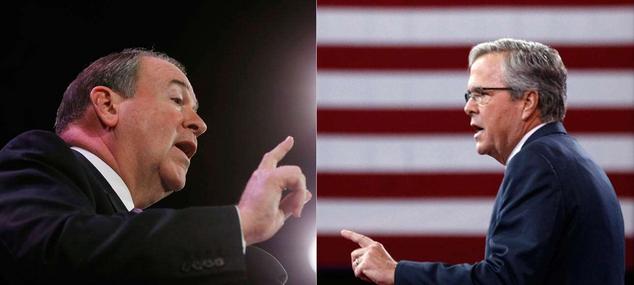Story Highlights
- Mike Huckabee and Jeb Bush well-known, well-liked
- Rand Paul and Marco Rubio also well-positioned
- Chris Christie rates low with conservatives, moderates/liberals
PRINCETON, N.J. -- Of 11 potential candidates for the 2016 Republican presidential nomination, Mike Huckabee and Jeb Bush are the most well-known and have the highest net favorable ratings among Republicans and Republican-leaning independents. While Chris Christie is one of the most familiar Republican figures among the party base, he has the lowest net favorable rating.

These findings are based on interviews with 653 Republicans and Republican-leaning independents in a March 2-4 Gallup poll. No major Republican figure has officially announced his or her candidacy at this point, although many have indicated they are seriously exploring the possibility -- and a number are making frequent trips to the early caucus and primary states of Iowa and New Hampshire.
Former Florida Gov. Jeb Bush is the best known of the 11 Republicans included in the poll, with 76% of Republicans and Republican leaners knowing enough about him to have an opinion. His top familiarity ranking is not surprising, given that his surname is one of the most famous in contemporary American presidential politics. Former Arkansas Gov. Mike Huckabee -- who made a strong bid for the 2008 GOP nomination and who has been a cable news talk-show host -- is almost as well-known (72% familiarity rating). Of these two, Huckabee has the slightly higher net favorable rating.
Kentucky Sen. Rand Paul has above-average familiarity, although he is not as well-known as Bush or Huckabee, and Paul's net favorable rating -- while also above average -- is slightly lower than that of the two ex-governors. Former Texas Gov. Rick Perry also has above-average familiarity among Republicans, and his net favorable score is right at average (30%).
Four other Republicans have an above-average net favorable score, but are below average in familiarity. These include, in order of their familiarity scores, Texas Sen. Ted Cruz, Florida Sen. Marco Rubio, Wisconsin Gov. Scott Walker, and physician Ben Carson. Rubio is the most positively evaluated of these four, and has the second-highest net favorable score of any Republican tested -- a percentage point below Huckabee's and three points higher than Bush's.
Both New Jersey Gov. Chris Christie and former Pennsylvania Sen. Rick Santorum are handicapped by low net favorable scores. Christie, whose name identification among Republicans is broadly similar to that of Bush and Huckabee, has the lowest net favorable score of any person tested (+9). Santorum, despite placing second to Mitt Romney in convention delegates for the 2012 GOP nomination, has below-average familiarity to go with his low net favorable score. Louisiana Gov. Bobby Jindal is one of the least-known potential candidates measured, and has a slightly below-average net favorable score.
Favorability, Familiarity Are Related
Overall, these data show that eight of the 11 potential Republican candidates measured have net favorable ratings in the 30+ range, although their familiarity scores vary widely. Favorable scores tend to go up as the individuals become better known, but in many instances, so do unfavorable scores. Nonetheless, Rubio, Cruz and Santorum have almost identical familiarity among Republicans, but Rubio's unfavorable rating is only 8%, compared with 21% for Santorum and 13% for Cruz. And Christie and Huckabee have almost identical familiarity, yet Christie has almost twice the unfavorables of Huckabee.

Conservatives Most Positive About Huckabee, Rubio, Cruz and Walker
Conservative Republicans are more positive than moderate/liberal Republicans about all of the potential candidates except for Christie, although conservatives are barely more positive than moderates/liberals about Bush. Christie's ratings among both groups are low, while Bush enjoys much higher evaluations.

Conservative Republicans are important in the presidential nominating process because they represent more than 60% of all Republicans and Republican-leaning independents and because they tend to be most heavily involved in the primary and caucus voting that determines the nominee. Conservatives are most likely to be positive about Huckabee and Rubio, although a number of other candidates are not far behind, including Cruz and Walker. Christie's net favorable rating among conservative Republicans (+9) stands out as the lowest of all those tested. Santorum, despite his staking out a strong conservative, family values orientation in his 2012 campaign, scores well below average among conservatives, while Jindal and Bush score slightly below average.
Moderate and liberal Republicans are less enthusiastic overall about the candidates, with an average +15 net favorable rating compared with the average +40 among conservative Republicans. Bush gets the highest rating among moderates/liberals, one that is more than twice the average. This gives Bush the advantage of reasonably high ratings among both ideological groups. Rubio also does better than average among moderates/liberals, to go along with his exceptionally high rating among conservatives, and Walker has a similar, although slightly less positive, image. Moderate/Liberal Republicans are by far the most negative about Santorum, giving him a -6 net favorable rating, and they give Texans Perry and Cruz below-average evaluations.
Implications
With the first Republican primary election still about 10 months away, many politicians are still in the "testing the waters" phase of the campaign. Republicans' familiarity with many of these individuals will no doubt increase in the months ahead, and others may jump into the race.
At this early juncture, however, several potential Republican candidates have image profiles among the national GOP rank-and-file that are worth noting. Bush and Huckabee enjoy the best combination of high familiarity and positive evaluations of any of the 11 politicians measured. Bush's image is built on solidly favorable ratings from both conservative and moderate/liberal Republicans, while Huckabee's much more reflects high ratings from conservatives.
At the other end of the spectrum, Christie receives below-average ratings from Republicans in both ideological groups, particularly conservatives, giving him the lowest overall net favorable ratings of any individual measured. Santorum joins Christie as the other candidate with significantly below-average net favorable ratings and, like Christie, suffers from low ratings among conservatives and, in particular, moderate/liberal Republicans.
Rubio and Walker also have net favorable scores that are among the highest measured, but neither is as well-known as Bush or Huckabee. Rubio, like Huckabee, does particularly well with conservatives, but unlike Huckabee has a well-above-average rating among moderate/liberal Republicans. Walker too has above-average ratings among both groups of Republicans.
Previous Gallup stories have reviewed Democrats' views of potential candidates from their party, and national adults' views of the entire field of possible candidates.
Survey Methods
Results for this Gallup poll are based on telephone interviews conducted March 2-4, 2015, on the Gallup U.S. Daily survey, with a random sample of 653 Republicans and Republican leaning independents, aged 18 and older, living in all 50 U.S. states and the District of Columbia. For results based on the total sample of national adults, the margin of sampling error is ±4 percentage points at the 95% confidence level. All reported margins of sampling error include computed design effects for weighting.
Each sample of national adults includes a minimum quota of 50% cellphone respondents and 50% landline respondents, with additional minimum quotas by time zone within region. Landline and cellular telephone numbers are selected using random-digit-dial methods.
Learn more about how Gallup Daily tracking works.

